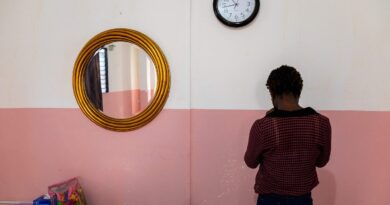For Russian political prisoners, Navalny’s death is reminder of peril
“For the first time, I am glad that the news took a while to get here. It would have been better if it didn’t come at all,” said Andrei Pivovarov, a Russian opposition activist who is serving a four-year sentence in Karelia in northern Russia after being arrested in 2021 on charges of working for an “undesirable organization.”
“This is no longer another step toward the abyss,” Pivovarov said, “but a flight into it, an acceleration.”
Since the February 2022 invasion of Ukraine, the Russian government has cracked down mercilessly on political opponents and critics of the war, prompting many to flee into exile and sweeping many into prison, often with exceedingly long sentences. Some were close associates of Navalny, like Vladimir Kara-Murza, a democracy advocate and Washington Post Opinions contributor, who was sentenced last year to 25 years for treason.
Human rights group Memorial has recognized nearly 630 people in Russia as political prisoners, which includes more than 400 persecuted for their religion. According to OVD-Info, a watchdog which tracks arrests and detention, more than 1,000 people have been imprisoned in Russia on politically motivated charges.
Ilya Yashin, a veteran opposition activist and longtime collaborator of Navalny’s beginning in the early 2000s when they were members of the progressive Yabloko political party, learned of his friend’s sudden death on Monday — three days after it occurred — from his lawyer who visited him.
“Tell me this isn’t true,” Yashin, in shock, initially pleaded with the lawyer, Mikhail Biryukov.
In 2022, Yashin was sentenced to eight years for publishing reports about atrocities by the Russian military in Bucha, Ukraine.
In a follow-up letter, Yashin wrote that “the pain and horror are unbearable.” He compared Navalny’s death with that of Boris Nemtsov, the opposition leader who was shot and killed near the Kremlin in 2015. Yashin also acknowledged the real danger he faces every day he remains imprisoned.
“Now both my friends are dead. I feel a black emptiness inside,” Yashin wrote. “And, of course, I understand my own risks. I am behind bars, my life is in Putin’s hands, and it’s in danger.”
Navalny’s widow, Yulia Navalnaya, his team and associates, have accused Russian President Vladimir Putin directly of having him murdered. President Biden and other leaders have said they hold Putin “responsible.”
Local authorities, however, said Navalny died of “natural causes” and have refused to release Navalny’s body to his mother, fueling accusations of a coverup. Lyudmila Navalnaya said Thursday that Russian officials were trying to “blackmail” her into holding a private funeral for her son, and they threatened to let his body decompose if she refused.
Prison conditions in Russia are notoriously bad, and rights groups have documented pervasive use of torture.
Navalny’s family, his political team and Russian journalists reporting on the prison system, said that prison officials had deliberately created “unbearable” conditions for Navalny since his arrest in January 2021, when he returned to Moscow from Germany where he was treated after being poisoned, by Russian security agents.
In all, Navalny spent 295 days in a punishment cell — with authorities often asserting that he breached minor prison rules. Inmates are not supposed to spend more than 15 days in such harsh confinement, and the European Court of Human Rights has recognized repeat placement in punishment cells as torture.
Navalny’s health was damaged by the poisoning attack, in which a military-grade nerve agent was laced in his underwear. He spent weeks in a coma and had to relearn how to walk and eat. After being jailed, his health continued to deteriorate, his family and lawyers said. In the years since, his team publicized multiple health scares and repeated denial of treatment.
Maxim Litavrin, a journalist for Mediazona, an independent Russian outlet covering Russia’s prison system, described conditions of a punishment cell as “terrible.” “We don’t know what killed Alexei Navalny, and we won’t find out until an independent examination,” Litavrin said, “but putting a person in such conditions for almost a year is murder.”
As for general health care in Russian prisons, Litavrin said: “There is practically no medicine.”
Inmates generally have access only to antiseptic and over-the-counter painkillers — ibuprofen if they are lucky. Prison medical staff are poorly paid and often poorly qualified.
“Complex diseases in colonies are not treated at all,” Litavrin said. Over the years, he added, the European Court of Human Right has been inundated with lawsuits by relatives of prisoners who died in Russian colonies due to lack of care.
A day before Navalny’s death, Ivan Zyryanov, a 43-year-old prisoner in the Trans-Baikal region, had to be carried into a court hearing after his legs stopped working — in part due to the lack of adequate medical care.
Alexei Gorinov, 62, a former local legislator in Moscow, was sentenced in July 2022 to seven years for denouncing the war in Ukraine. Gorinov suffers from a chronic disease, is missing part of a lung and has been placed in a punishment cell at least five times, his lawyers said.
The lawyers said that he suffers from fevers and bronchitis, but prison authorities are denying him access to a medical unit.
After Navalny’s death, families of political prisoners said they are more frightened than ever.
“It’s a lot scarier now,” said Tatiana Balazeikina, whose son, Yegor Balazeikin, 17, is serving six years for terrorism after throwing a molotov cocktail at a military registration office last year to protest the war.
“We understand that if they didn’t save a well-known figure like Navalny, then as for a bunch of convicts that the world doesn’t really know about — no one will take care of them at all,” Balazeikina said.
Balazeikin suffers from a complex autoimmune disease, his mother said, and according to the rules of the juvenile detention center, his parents can provide medicine and take him for independent examinations. But Balazeikina said that after a doctor’s visit in August, her son was prescribed a treatment for ulcers, which he was never given. Last week, a doctor said the ulcers had worsened.
“For people who are in prison, the responsibility lies with the state for their health and for their lives,” Balazeikina said. “Neither parents, nor lawyers, nor any other relatives can control a person’s stay behind bars in any way.” She said she worries constantly for her son.
“If a person dies in prison, it doesn’t matter for what reasons,” Balazeikina said, “then only the state is to blame.”
Alexandra Popova, 30, a human rights activist and wife of imprisoned poet Artyom Kamardin — who late last year was sentenced to seven years for public readings of antiwar poetry — spoke of the pain of knowing there is nothing she can do to guarantee his safety
“Alexei Anatolyevich’s death showed that it’s true that no one is safe,” she said, referring to Navalny respectfully by his patronymic. “All the people who are currently in custody in pretrial detention centers and colonies — they’re closer to death than life. And every … healthy body has its limits. If things are constantly thrown at a person, they lose their will to live.”
On Monday evening in central Moscow, Veronika, 42, an illustrator from the Russian capital, approached the Solovetsky Stone, a memorial for victims of the gulag, and placed a bunch of scarlet carnations amid the snow, in memory of Navalny.
“It is clear that he died in agony — and this terrifies me,” Veronika said. “I know that there are a lot of other political prisoners now who are also being slowly killed in prison. And I understand that our flowers are not really going to help them.”




